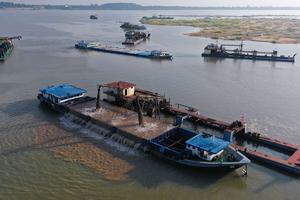Phnom Penh is rapidly developing, but its growth has come at a high cost to villagers who depend on the health of the Mekong River. Filmmaker Andy Ball follows two families — one living on a wetlands on the outskirts of the capital and the other living on the Mekong’s banks 20 miles upstream — who have had their lives torn apart by sand mining.
The government supports sand mining, but Cambodian and British researchers have found that miners are taking about three times the volume of sand reported by the government. Ball’s sources requested anonymity, and their faces are not shown; in Cambodia, those speaking out against environmental harms have been jailed and even killed.
“Lost Lands” was commissioned by the University of Southampton’s Shifting Sands Project, which is measuring the factors that drive water and sediment dynamics in the Mekong River basin. Sand mining isn’t the only threat faced by the Mekong: massive hydropower dams and climate change are also impacting the river. Says Ball, “We’d like this film to give viewers the chance to consider the delicate balance between rapid development and its trade-offs; how can we best balance the relationship between the two?”
About the Filmmaker: Andy Ball is a British documentary filmmaker based in Cambodia. He has a background in marine biology and covers stories that revolve around the intersection of human society and the environment. He has worked on documentaries for the BBC, CBS, and Business Insider.
About the Contest: Now in its 10th year, the Yale Environment 360 Film Contest honors the best environmental documentaries, with the aim of recognizing work that has not previously been widely seen. This year we received 582 submissions from 76 countries across six continents, with the winners selected by Pulitzer Prize-winning author Elizabeth Kolbert, Academy Award-winning documentary filmmaker Thomas Lennon, and e360’s executive editor Roger Cohn.


